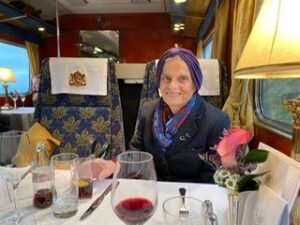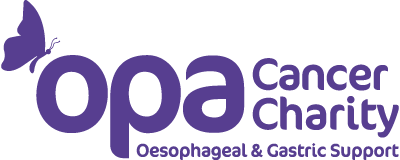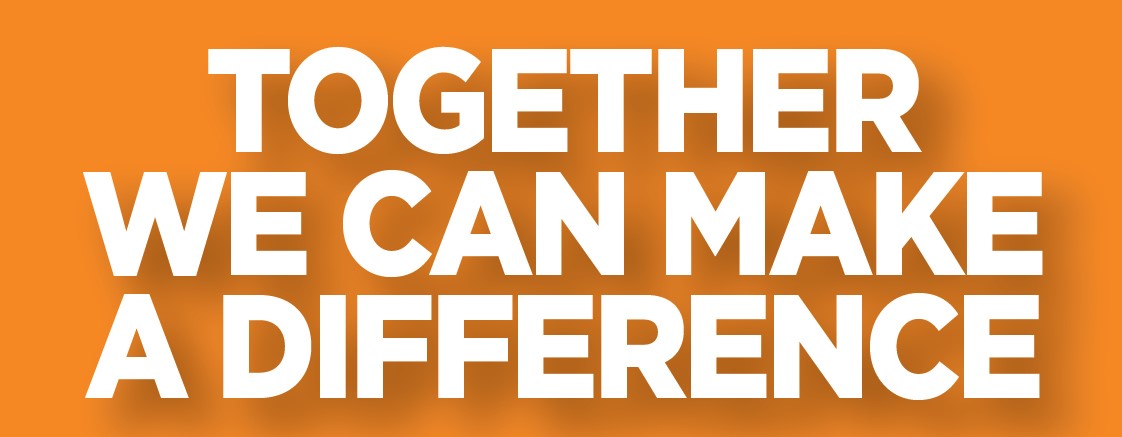My Story of Stage 2 Oesophageal Cancer
Sian Wade
I was diagnosed with stage 2 inoperable oesophageal cancer in November 2020, just after the start of the second lockdown. On further investigation it emerged that there was a ‘bulky tumour’ in my oesophagus and wrapped around the pericardium of my heart. There was one affected lymph node which was contained within my chest cavity.
I have none of the risk factors associated with oesophageal cancer as I have always had a low BMI, have never smoked, hardly ever drunk alcohol, didn’t eat spicy food and had no evidence of acid reflux, indigestion, burping or any of the reported risk factors. The only possible symptom I had, prior to having difficulty swallowing, was a constant gnawing sensation with which I had presented to my GP in 2016, and been referred me for an endoscopy ( I have an excellent GP). I observed this scope as I was not sedated and could see nothing suspicious, not that I would necessarily know, but nor could the Doctor who did it. Retrospectively I wonder if there were some very early cell changes (pre- cancerous), that the current research into the use of the cystosponge may have picked up back then.
I have been a nurse for 45 years, and I do remember learning from my medical texbook as a student nurse, about gnawing being a symptom of gastric or duodenal ulcers, as they were referred to in those days. But I never hear that symptom mentioned in current literature so I do wonder what current thoughts would be about this. The only other risk factor that I could have had, and again is not frequently quoted in the literature, was that I tended to drink my fluids quite hot. I was also shown to have a positive result for faecal occult bloods when I was screened for bowel cancer the year before. I was called for a colonoscopy and again there really was nothing to show on that investigation. I retrospectively wonder if this could have been from my oesophageal tumour, which when diagnosed a year later, was 8cm long in the mid- region of my oesophagus. I asked my Oncologist if this could be the case and she said she thought it was possible. My colleague believes I had had it for a long time, as I hadn’t looked well.
On diagnosis I set out on what was a challenging 3 months of active treatment, which I think was quite aggressive. I was eligible to enter the SCOPE 2 trial for which I had a raft in investigations (hampered a little by lockdown). Scope 2 is a first line trial that you may be eligible for from the start. You start with the standard chemo and before your next three weekly chemo have a further PET scan. You are then randomised into the standard chemo or an alternative, depending, I think, on certain factors such as the amount of reduction in the size of the tumour in those three weeks. I was randomised into an alternate chemo, but one that is already used, certainly at the Trust I was being treated at. As well as this you are randomised into the standard radiotherapy of 50 rads, or the experimental dose of 60 rads – I was randomised into the standard radiotherapy, which was to prove a ‘blessing’ given later treatment outcomes.
I was used to visiting patients who where having or had had chemo, so I think I was very well prepared for how unwell I would be. I am also very determined but maybe I was lucky to tolerate the treatment (just about although very poorly), and also had a naso-jejunal feeding tube which goes into the jejunam, beyond the stomach (NJ tube). This was my ‘life saver’ as I couldn’t eat for weeks. I made it through the full treatment, ending up in hospital only at the end with septicaemia and pancytopenia (very few blood cells), for which I was treated with strong IV antibiotics and a blood transfusion. I was poorly and weak and had dealt with the treatment almost on my own, due to lockdown. I was very lucky to be able to organise a rota of just a few people who offered to drive me to the hospital for all the chemo and combined chemo and radiotherapy (the latter being for 5 weeks at the end with weekly chemo. I am eternally grateful to all those friends and other friends who have helped or supported during this difficult time (especially with lockdown).
After the treatment I still couldn’t swallow very much and kept being sick. I continued with the feed and NJ tube while it lasted. Initially my Oncologist thought it was inflammation of my oesophagus, but at my post treatment CT scan after 6 months, it was very evidently a stricture. I then spent the next year having further endoscopies under sedation and dilations (having to self-isolate for three days prior to them each time). I think I had at least ten in total. Whilst I was having these I developed severe back pain in the November of 2021, which revealed a spontaneous vertebral wedge fracture of the thoracic vertebra, behind the region of the tumour. Further pain resulted in a cascade of four more vertebral fractures which became evident when I had a Dexa scan (scan of my bones), which my GP had arranged speedily. I turned out to have pre-existing severe osteoporosis, probably due to anorexia nervosa (but never made myself sick), that I had for a number of years in my late teens/early 20’s at a time when this was not monitored.
So I have been on a bit of journey. I walked off my shift the day before that diagnostic endoscopy in November 2020. I didn’t believe it could be anything so serious, as that would have been making a fuss, but I have never returned to nursing as it just hasn’t been realistic with my back pain, stricture and vomiting and the fatigue I experience even now. I have now survived for 3 1/2 years and so far can’t find anyone else in my situation. I think I may be lucky, but it has meant really adjusting and adapting to a changed lifestyle, as I was so active before and worst of all nursing. But life serves you challenges and I was lucky to be able to survive the treatment and still get out and about and I walk each day now, albeit in a more limited way- especially with the fatigue.
There are several areas I wonder about and would like to raise awareness of, to try to help others going through what I have been through. Why isn’t the gnawing sensation ever mentioned? Would I ever have been presented for screening with the cystosponge, as I had no real recognised risk factors and could I have been diagnosed sooner? Could the knowing sensation have been an indicator of oesophageal cancer? For breast cancer, patients have a Dexa scan to screen for osteoporosis due to the hormone involvement. Would this ever happen for oesophageal or certain other cancers where radiotherapy is quite strong and the patient has a history of an eating disorder? It may not have made a difference but I could I could maybe have started the treatment of Denusomab injections every six months for my oesteoporosis, sooner? Denusomab injections are used to slow and strengthen bones. I also think I was very lucky not to have been randomised into the higher dose of radiotherapy as the standard dose did enough damage.
I am most grateful to my Consultant and the Team at the University Hospital of Coventry and my wonderful GP ( who was and is always ‘there for me’) – my care has been ‘second to none’, despite all the challenges of COVID.


